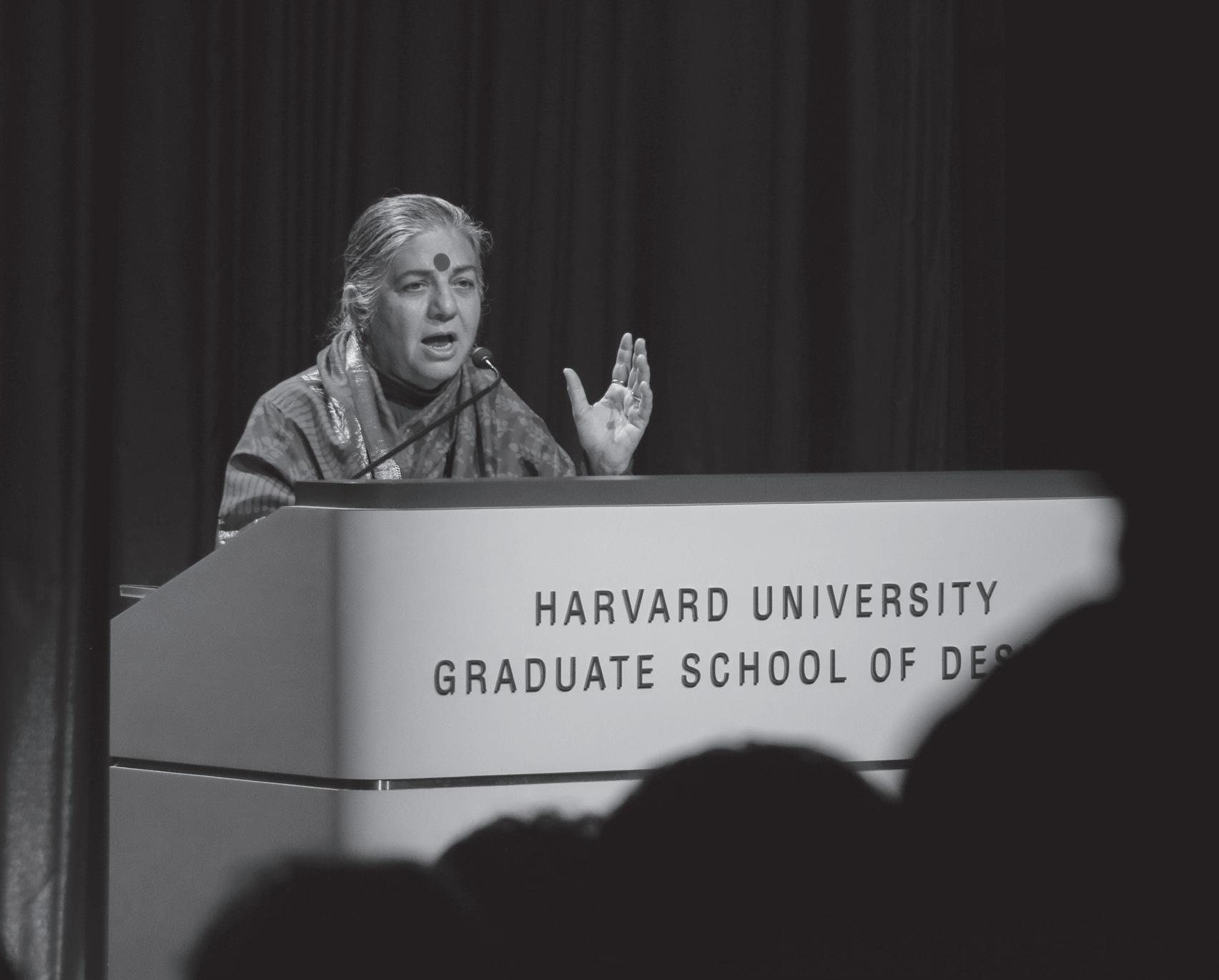PAGE 3
THE HARVARD CRIMSON | MARCH 4, 2020
Activist Speaks at Design School ‘Womxn’s Week’ By ELIZABETH H, GELLERT and RAQUEL CORONELL URIBE CRIMSON STAFF WRITERS
Dr. Vandana Shiva, an Indian scholar and environmental activist, spoke at the 2020 International Womxn’s Day Lecture at the Harvard University Graduate School of Design. JONATHAN G. YUAN—CRIMSON PHOTOGRAPHER
New ‘HouseCall’ App to Tackle Spread of Disease By VIRGINIA L. MA CRIMSON STAFF WRITER
embers of Global Alliance M for Medical Innovation, a student-run organization, are working to develop a mobile application for symptom reporting to Harvard University Health Services in collaboration with Organismic and Evolutionary Biology professor Pardis C. Sabeti. The application, called HouseCall, would allow students to report symptoms remotely and receive consultation and treatment in their rooms, rather than going to HUHS. The developers hope this will minimize the spread of infectious diseases on campus. The application was inspired by recent discoveries by Sabeti’s lab group regarding the 20162017 mumps outbreak on Harvard’s campus. With over 60 confirmed cases, the outbreak served as a reminder of the many spots on campus vulnerable to the spread of infectious diseases, including the HUHS waiting room, Sabeti said. Global Alliance for Medical Innovation founder Sreekar Mantena ’22 said the goal of the application is to minimize spread of infectious diseases,
such as mumps, influenza, and coronavirus. “Coronavirus, as a respiratory pathogen, is passed on by droplet-based transmission, so being able to limit such an infectious disease pathogen would be really powerful in improving our ability for public health response,” Mantena said. “With infectious diseases, obviously, once you leave the room you’re in contact with a bunch of peers, students, HUHS members, faculty and that leads to a lot of spread on campus,” he added. HouseCall would give students a way to report illnesses and receive care, all from the comfort of their bed. After reporting symptoms, a member of HUHS or someone in the House system would receive the report and go to the student’s room to perform a rapid diagnostic test and provide the necessary treatment for the diagnosed illness, Mantena said. Sabeti said this reporting process would not diminish the amount of information health care practitioners get from a patient. “Instead of going to the pharmacy to get your medicine, why don’t we bring it to you? And when we bring it to you,
why don’t we get more information about your symptoms?” Sabeti said. Mantena said the group hopes to have the app ready for rollout in three to four weeks. While the short-term goal is to implement the app in the the Houses, the group hopes to eventually take the framework of HouseCall to other parts of the world, such as West Africa. “When someone feels sick, they can report their symptoms and then a community health worker could come to their house to do a rapid diagnostic test and ensure everything’s okay, give treatment, and especially on a larger scale like on a country scale, being able to track specific cases with geospatial and also diagnostic test data would be really powerful,” Mantena said. Mantena said the group hopes the implementation of HouseCall on Harvard’s campus can serve as a test run for such broader implementation. “Being able to do a field trial of a system like this at Harvard would be really credible because we have a really great, controlled environment to work in,” he said. virguinia.ma@thecrimson.com
hysicist and environmental acP tivist Vandana Shiva cautioned against globalization and industrial agriculture while delivering the Harvard Graduate School of Design’s annual International Womxn’s Day keynote lecture Tuesday evening. The talk featured an introduction by the co-chairs of the Design School’s Womxn in Design group followed by Shiva’s lecture, which was focused on her environmental activism and advocacy. “If the whole world farmed through biodiversity, if the whole world farmed organically, we could actually reverse climate change,” Shiva said during the talk. The talk was part of an annual series of International Womxn’s Week events hosted by Womxn in Design. “It’s just a week of celebration,” organizer Vaissnavi Shukl said. “This time we are focusing on kinship and not just limiting kinship to relationships between humans but also relationships between women and
ple of color and marginalized groups. Womxn in Design wrote in an emailed statement that it invited Shiva to elevate a dialogue about “relationship between womxn and nature, and between the patriarchy and environmental degradation.” “This discourse is grossly under-explored at the GSD—but critical in light of womxn’s historical under-representation and marginalization in/through the design fields,” Womxn in Design’s statement reads. Some attendees of the Harvard talk said they were skeptical of Shiva’s remarks. “What worries me about her position is that it, and I understand for ideological and political objectives, just over simplifies the situation,” Design School student Nicolas Delgado Alcega said. In response to Delgado Alcega, Shiva wrote in an emailed statement that she “differentiated between fossil fuel based societies, and societies that function as part of nature’s systems, cycles and biodiversity.” elizabeth.gellert@thecrimson.com
POLLS FROM PAGE 1
Voters Head to the Polls Across Cambridge, Allston that former South Bend, Ind. Mayor Peter P.M. Buttigieg ’04 exited the presidential race Sunday night. At the polls Tuesday, she said she voted for Biden but was not “excited about him.” “He’s the safest,” she said. “I know pundits that I hear on TV — people who are really staunch republicans — that would vote for Joe Biden.” At City Hall, voters stirred and made small talk as volunteers dealt with a jammed ballot box. Cambridge residents from a wide age range don small oval “I Voted!” stickers. At one point, a woman with a baby strapped to her chest placed a sticker on the baby’s shirt and posed for a selfie. Maureen C. Ryan, who has lived in Massachusetts for over 30 years, said she voted for U.S. Senator and former Harvard Law School professor Elizabeth Warren (D-Mass.) because she was the most “qualified” person for the job. Warren cast her own ballot in Cambridge Tuesday morning, her dog Bailey and husband and Law School professor Bruce H. Mann in tow. “I’ve been following her, lis-
Transformative coverage.
The Crimson thecrimson.com
the environment, women and soil, women and seeds, and to kind of humanity and other species.” In her lecture, Shiva encouraged audience members to “celebrate the earth.” “It’s time to put away the arrogance that some humans are above other humans and that those other humans are superior to other species,” she said. “That’s anthropocentrism. Let’s say bye bye to racism, to sexism, to anthropocentrism, and celebrate the earth.” Shiva’s talk comes in light of recent controversy after she delivered a different environmental lecture at Stanford on January 23. A letter published in European Scientist condemned Stanford’s decision to invite Shiva because of her use of “anti-scientific rhetoric to support unethical positions.” An op-ed written by Students for a Sustainable Stanford and published in The Stanford Daily shortly after Shiva’s Stanford talk defended the decision to invite her to speak. The letter cited Shiva’s global recognition and Students for a Sustainable Stanford’s mission to represent peo-
tening to her all along her campaign trail,” Ryan said about Warren. Cambridge resident Kathy R. Weller offered a blunter assessment of the Bay State senator.
It’s amazing to me that starting off with a diversity of candidates we had, we ended up with all these people in their 70s. Maggie Brown Cambridge Resident
“She’s a badass,” Weller said. “She just cuts through the crap and I really trust her.” As lines at various polling locations ebbed and flowed Tuesday afternoon, several voters had their eye on the general election. Sanika S. Mahajan ’21 said she entered a voting booth in Quincy House as a Warren supporter. After voting, she described
the senator as the progressive candidate with the “most actionable plans.” Mahajan said she thinks voter turnout among youth and minorities is particularly important. “Young voters and people of color and women showing that they’re going to vote for the Democratic nominee — no matter who it is — in November is so important, even beginning now,” she said. Eli B. Frankel ’22 said he voted for Sanders with his eye on November turnout. “I think that the excitement that he energized in people is sufficient to beat Trump in the general election,” Frankel said. Despite bubbling in Biden’s name, Brown said she walked away from the booth with a hint of disillusionment over the remaining Democratic nominees. “It’s amazing to me that starting off with a diversity of candidates we had, we ended up with all these people in their 70s,” she said. joshua.fang@thecrimson.com jasper.goodman@thecrimson.com taylor,peterman@thecrimson.com charles.xu@thecrimson.com




